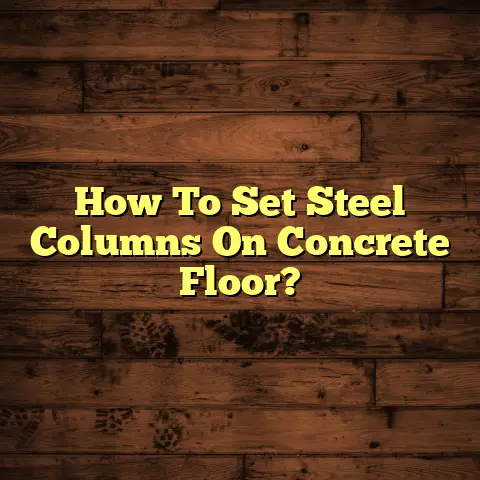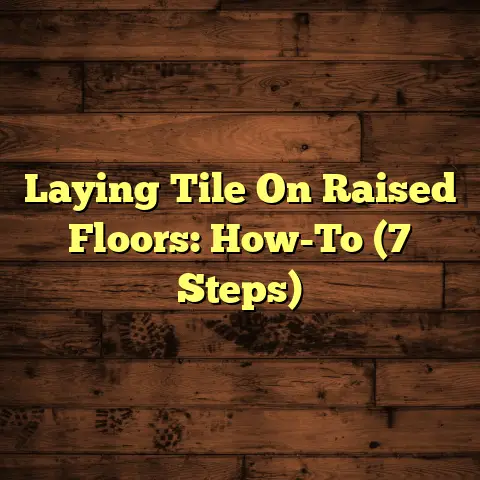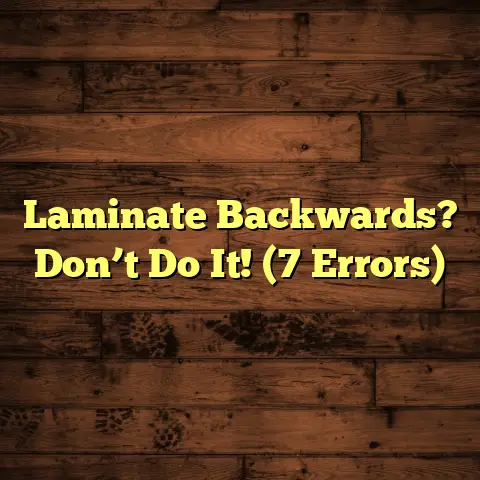Vct Flooring Cost (Explained)
VCT Flooring Cost (Explained)
When it comes to flooring options, vinyl composition tile (VCT) is a popular choice for both residential and commercial spaces. Understanding the costs associated with VCT flooring installation is crucial for making informed decisions. This article provides a comprehensive breakdown of the factors influencing VCT flooring costs, compares it with alternative flooring options, and discusses maintenance and care tips to ensure longevity.
Overview of Major Cost Factors
Several factors impact the total cost of VCT flooring installation. Understanding these components will help you budget effectively.
1. Area Size
The size of the area to be covered is one of the primary determinants of cost. Larger spaces will require more materials and labor, leading to higher overall expenses.
2. Type of VCT
VCT comes in various designs and thicknesses, including standard vinyl tiles, luxury vinyl tiles (LVT), and even eco-friendly options. The type selected will significantly impact the cost per square foot.
3. Labor Costs
Labor costs can vary depending on location and the complexity of the installation. A straightforward installation in a large, open area will typically be less expensive than complex layouts with many cuts or patterns.
4. Additional Considerations
- Floor Removal: If you need to remove an existing floor, this can add to the total cost.
- Subfloor Replacement: A damaged subfloor may require replacement, adding further expenses.
- Material Grade: Higher-quality VCT tiles often come with a higher price tag but can offer better durability and aesthetics.
- Room Size/Layout: Non-standard room shapes or sizes might require additional cutting and fitting, which can increase labor costs.
- Installation Type: Whether you choose to have the flooring glued down or installed as a floating floor affects costs.
Detailed Cost Breakdown
Pricing by Project Size
Here’s a rough estimate of costs based on common project sizes:
| Project Size | Estimated Cost (Materials + Labor) |
|---|---|
| Small Room (100 sq. ft.) | $1,000 – $1,500 |
| Medium Room (300 sq. ft.) | $2,500 – $4,000 |
| Large Room (500 sq. ft.) | $4,000 – $7,000 |
Pricing by VCT Type
- Standard VCT: $1.50 – $2.50 per sq. ft.
- Luxury Vinyl Tile (LVT): $3.00 – $5.00 per sq. ft.
- Eco-Friendly VCT: $4.00 – $7.00 per sq. ft.
Comparison with Alternative Flooring Options
Understanding how VCT compares with other flooring alternatives is essential in making a choice that fits your budget and needs.
Laminate Flooring
- Cost: $1.00 – $3.00 per sq. ft.
- Pros: Easy to install, scratch-resistant.
- Cons: Less durable than VCT for commercial use.
Vinyl Flooring
- Cost: $2.00 – $4.00 per sq. ft.
- Pros: Water-resistant, comfort underfoot.
- Cons: May not offer the same aesthetic appeal as VCT.
Carpet
- Cost: $1.50 – $5.00 per sq. ft.
- Pros: Soft underfoot, good insulation.
- Cons: Harder to clean and maintain; can trap allergens.
Signs Your VCT Flooring Needs Replacement
Recognizing when it’s time to replace your VCT flooring is crucial for maintaining aesthetics and functionality:
- Visible Damage: Cracks or significant wear and tear.
- Separation or Lifting: Tiles coming loose or separating from the subfloor.
- Stains or Odours: Persistent stains that cannot be removed or unpleasant odours can indicate deeper issues.
To Refinish or Replace?
Before deciding to replace your VCT flooring, consider:
- Refinishing Costs: Generally lower than replacement but may not be suitable for severely damaged floors.
- Replacement Benefits: New flooring can enhance aesthetics and functionality.
Pros and Cons of VCT Flooring
Pros
- Durability: Resistant to wear, making it ideal for high-traffic areas.
- Easy Maintenance: Simple cleaning routines keep it looking fresh.
- Affordability: Offers good value compared to other flooring types.
Cons
- Temperature Sensitivity: Can expand or contract with temperature changes.
- Installation Complexity: Requires skilled labor for optimal results.
Professional Installation vs. DIY
Cost Differences
- Professional Installation: Typically adds 20%-30% to the material cost but ensures proper fitting and longevity.
- DIY Installation: While it can save money, it requires tools and skills that may not be readily available.
Tools Needed for DIY
- Utility knife
- Measuring tape
- Straight edge
- Trowel
- Roller
Questions to Ask Hardwood Flooring Contractors
When hiring a contractor for installation, consider asking:
- What is included in your estimate?
- How long will the installation take?
- Do you have references from past clients?
- What kind of warranty do you offer?
- How do you handle unexpected issues during installation?
Care and Maintenance Tips for Longevity
To maximize the lifespan of your VCT flooring:
- Regularly sweep or vacuum to remove dirt and debris.
- Use a damp mop with a pH-neutral cleaner specifically designed for vinyl.
- Avoid harsh chemicals that could damage the finish.
- Protect high-traffic areas with rugs or mats.
Conclusion
When considering VCT flooring, understanding the costs associated with installation is key to making an informed choice that suits your style and budget. By weighing all factors—from area size and type of tile to labor costs and maintenance—homeowners can ensure they select the best flooring option for their space. Whether opting for professional installation or going the DIY route, being well-informed will lead to satisfactory results and a beautiful floor that lasts for years to come.





